Blog
James Andrew Rushing (August 26, 1901 – June 8, 1972) was an American singer and pianist from Oklahoma City, Oklahoma, U.S., best known as the featured vocalist of Count Basie‘s Orchestra from 1935 to 1948.
Rushing was known as “Mr. Five by Five” and was the subject of an eponymous 1942 popular song that was a hit for Harry James and others; the lyrics describe Rushing’s rotund build: “he’s five feet tall and he’s five feet wide”. He joined Walter Page‘s Blue Devils in 1927 and then joined Bennie Moten‘s band in 1929. He stayed with the successor Count Basie band when Moten died in 1935.
Rushing said that his first time singing in front of an audience was in 1924. He was playing piano at a club when the featured singer, Carlyn Williams, invited him to do a vocal. “I got out there and broke it up. I was a singer from then on,” he said.
Rushing was a powerful singer who had a range from baritone to tenor. He has sometimes been classified as a blues shouter. He could project his voice so that it soared over the horn and reed sections in a big-band setting. Basie claimed that Rushing “never had an equal” as a blues vocalist, though Rushing “really thought of himself as a ballad singer.” George Frazier, the author of Harvard Blues, called Rushing’s voice “a magnificent gargle”. Dave Brubeck defined Rushing’s status among blues singers as “the daddy of them all.” Late in his life, Rushing said of his singing style, “I don’t know what kind of blues singer you’d call me. I just sing ’em.” Among his best-known recordings are “Going to Chicago”, with Basie, and “Harvard Blues”, with a saxophone solo by Don Byas.
more...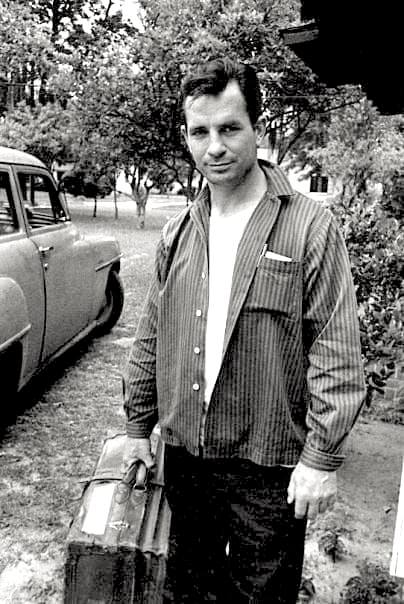
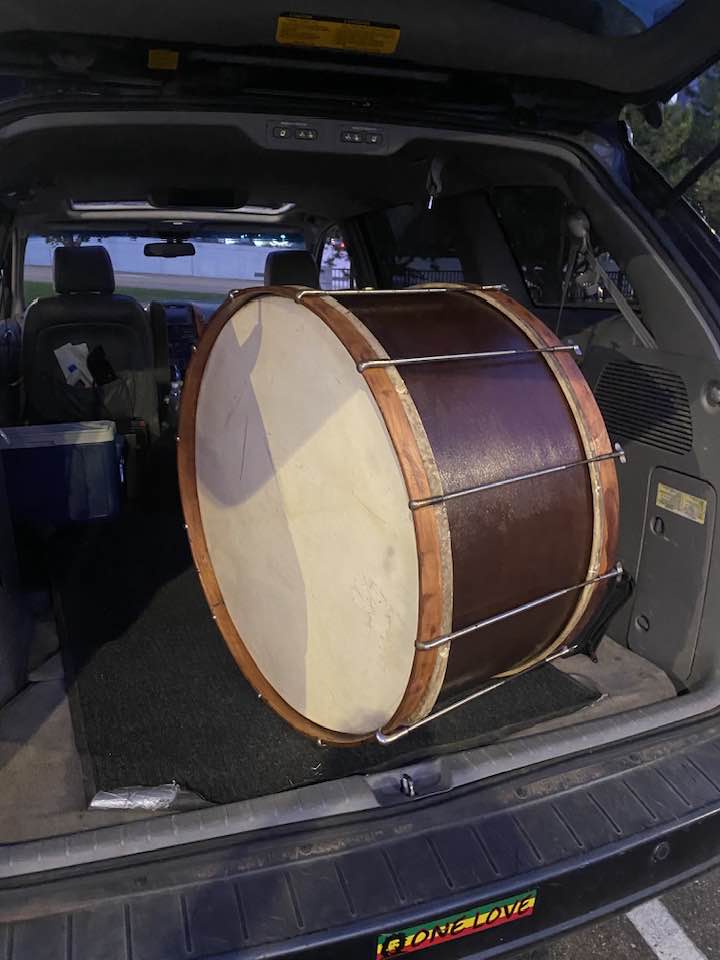

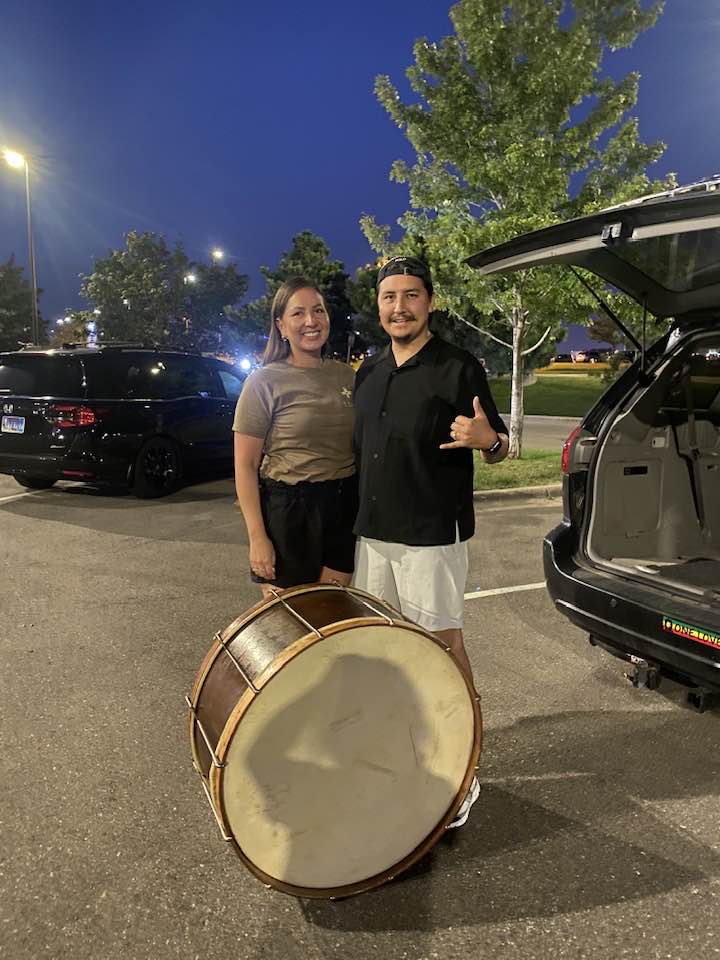
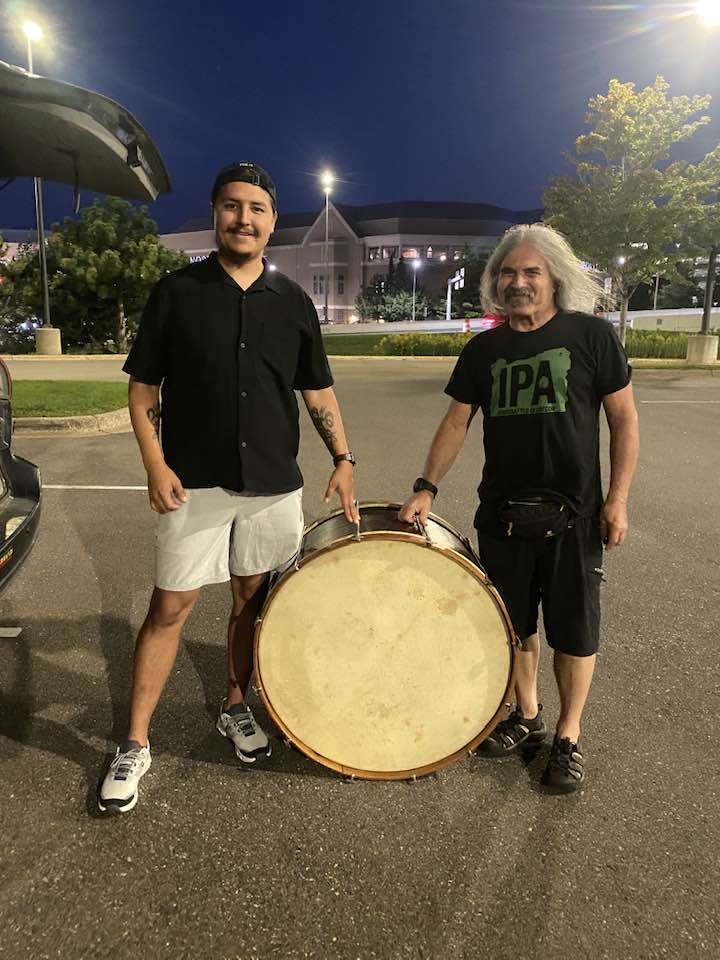
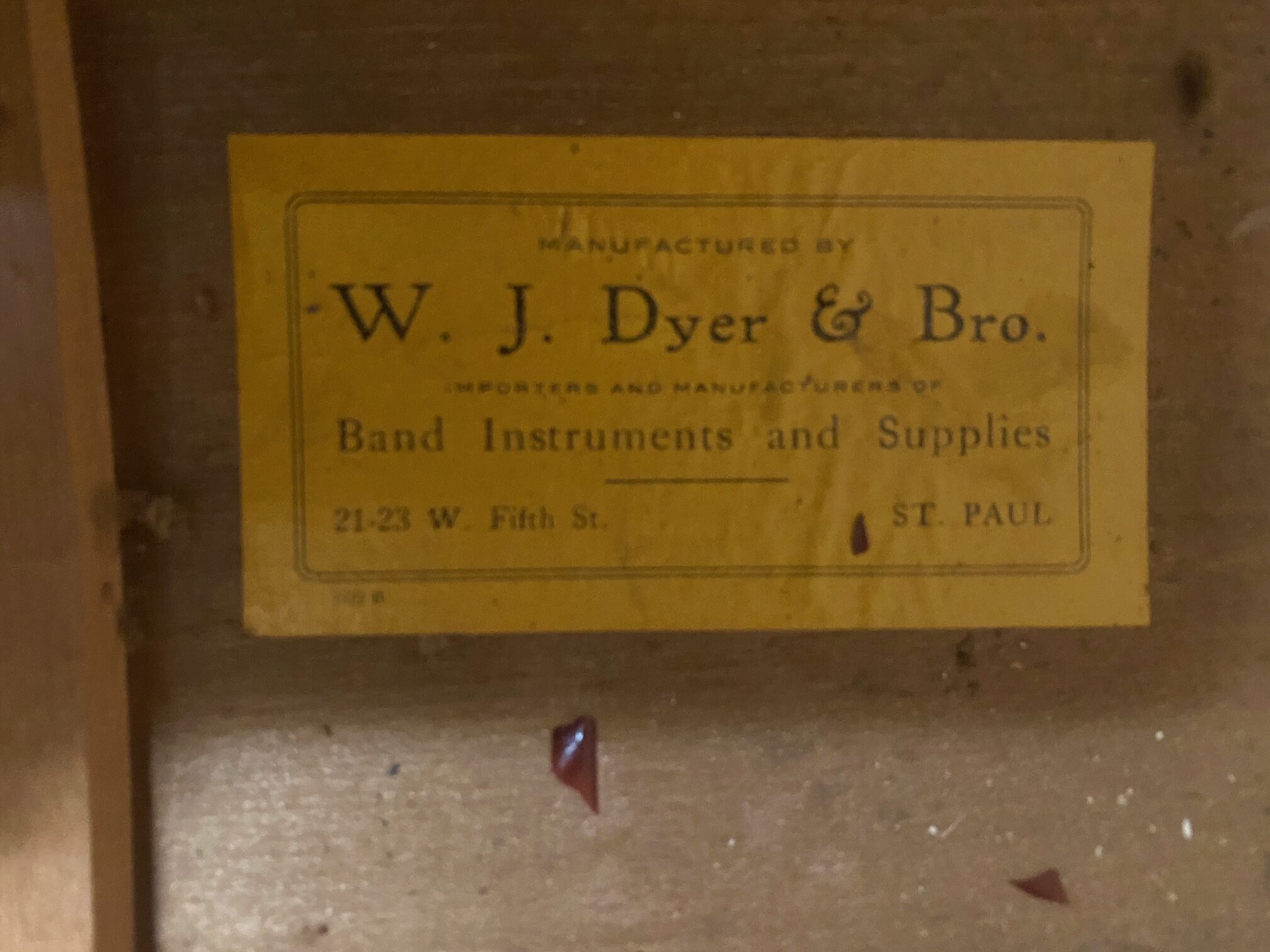
Long features dubbed tiger stripes are known to be spewing ice from the moon’s icy interior into space, creating a cloud of fine ice particles over the moon’s South Pole and creating Saturn‘s mysterious E-ring. Evidence for this has come from the robot Cassini spacecraft that orbited Saturn from 2004 to 2017. Pictured here, a high resolution image of Enceladus is shown from a close flyby. The unusual surface features dubbed tiger stripes are visible in false-color blue. Why Enceladus is active remains a mystery, as the neighboring moonMimas, approximately the same size, appears quite dead. An analysis of ejected ice grains has yielded evidence that complex organic molecules exist inside Enceladus. These large carbon-rich molecules bolster — but do not prove — that oceans under Enceladus’ surface could contain life.

Linda May Han Oh (born 25 August 1984) is an Australian jazz bassist and composer. She is currently Associate Professor at the Berklee College of Music and is also part of the Institute for Jazz and Gender Justice.
Born in Malaysia, Oh was raised in Western Australia. When she was 11, she started to play the clarinet and at the age of 13 bassoon. She went to Churchlands Senior High School. As a bass guitarist, she started in a high school band; and in 2002, she attended the Western Australian Academy of Performing Arts, where she picked up the upright bass and studied solo transcriptions of Dave Holland. Her thesis was on the classical Indian music rhythms in Holland’s solos. After more scholarships she moved to New York in 2008, where she completed her master’s degree at the Manhattan School of Music, among others with Jay Anderson, John Riley, Phil Markowitz, Dave Liebmanand Rodney Jones as supervisors.
more...Pat Martino (born Patrick Carmen Azzara; August 25, 1944 – November 1, 2021) was an American jazz guitarist and composer. He has been cited as one of the greatest guitarists in jazz.
Martino was born Patrick Carmen Azzara in Philadelphia, Pennsylvania, United States, to father Carmen “Mickey” Azzara (d. 1990) and mother Jean (née Orlando, d. 1989).He was first exposed to jazz by his father, who sang in local clubs and briefly studied guitar. Pat studied with renowned jazz teacher Dennis Sandole, and in his studio met other of Sandole’s students; among them, John Coltrane, James Moody, McCoy Tynerand others. Martino began playing professionally at the age of 15 after moving to New York City. He lived for a period with Les Paul and began playing at jazz clubs such as Smalls Paradise. He later moved into a suite in the President Hotel on 48th Street. He played at Smalls for six months of the year, and played summers at the Club Harlem in Atlantic City, New Jersey.
more...Wayne Shorter (August 25, 1933 – March 2, 2023 Newark, NJ) was an American jazz saxophonist, composer and bandleader. Shorter came to mainstream prominence in 1959 upon joining Art Blakey‘s Jazz Messengers, for whom he eventually became the primary composer. In 1964 he joined Miles Davis‘ Second Great Quintet, and then co-founded the jazz fusion band Weather Report in 1970. He recorded more than 20 albums as a bandleader.
Many Shorter compositions have become jazz standards. His music has earned worldwide recognition, critical praise, universal commendation, and 12 Grammy Awards. He was acclaimed for his mastery of the soprano saxophone since switching his focus from the tenor in the late 1960s and beginning an extended reign in 1970 as DownBeat‘s annual poll-winner on that instrument, winning the critics’ poll for 10 consecutive years and the readers’ for 18. The New York Times music critic Ben Ratliff described Shorter in 2008 as “probably jazz’s greatest living small-group composer and a contender for greatest living improviser”. In 2017, he was awarded the Polar Music Prize.
Herbie Hancock said of Shorter’s tenure in Miles Davis‘s Second Great Quintet: “The master writer to me, in that group, was Wayne Shorter. He still is a master. Wayne was one of the few people who brought music to Miles that didn’t get changed.” Davis said, “Wayne is a real composer. He writes scores, writes the parts for everybody, just as he wants them to sound. … Wayne also brought in a kind of curiosity about working with musical rules. If they didn’t work, then he broke them, but with musical sense; he understood that freedom in music was the ability to know the rules, in order to bend them to your own satisfaction and taste.”
Ian Carr, musician and Rough Guide author, said that with Davis, Shorter found his own voice as a player and composer. “Blakey’s hard-driving, straight-ahead rhythms had brought out the muscularity in Shorter’s tenor playing, but the greater freedom of the Davis rhythm-section allowed him to explore new emotional and technical dimensions.”
Shorter remained in Davis’s band after the breakup of the quintet in 1968, playing on early jazz fusion recordings including In a Silent Way and Bitches Brew (both 1969). His last live dates and studio recordings with Davis were in 1970.
Until 1968, he played tenor saxophone exclusively. The final album on which he played tenor in the regular sequence of Davis albums was Filles de Kilimanjaro. In 1969, he played the soprano saxophone on the Davis album In a Silent Way and on his own Super Nova(recorded with then-current Davis sidemen Chick Corea and John McLaughlin). When performing live with Davis, and on recordings from summer 1969 to early spring 1970, he played both soprano and tenor saxophones: by the early 1970s, however, he chiefly played soprano.
more...Leonard Bernstein (born Louis Bernstein; August 25, 1918 – October 14, 1990 Lawrence, MA) was an American conductor, composer, pianist, music educator, author, and humanitarian. Considered to be one of the most important conductors of his time, he was the first American-born conductor to receive international acclaim. Bernstein was “one of the most prodigiously talented and successful musicians in American history” according to music critic Donal Henahan. Bernstein’s honors and accolades include seven Emmy Awards, two Tony Awards, and 16 Grammy Awards(including the Lifetime Achievement Award) as well as an Academy Awardnomination. He received the Kennedy Center Honor in 1981.
As a composer, Bernstein wrote in many genres, including symphonic and orchestral music, ballet, film and theatre music, choral works, opera, chamber music, and pieces for the piano. Bernstein’s works include the Broadway musical West Side Story, which continues to be regularly performed worldwide, and has been adapted into two (1961and 2021) feature films, three symphonies, Serenade after Plato’s “Symposium” (1954), and Chichester Psalms (1965), the original score for the Elia Kazan drama film On the Waterfront (1954), and theater works including On the Town (1944), Wonderful Town(1953), Candide (1956), and his Mass (1971).
Bernstein was the first American-born conductor to lead a major American symphony orchestra. He was music director of the New York Philharmonic and conducted the world’s major orchestras, generating a legacy of audio and video recordings.Bernstein was also a critical figure in the modern revival of the music of Gustav Mahler, in whose music he was most interested. A skilled pianist, Bernstein often conducted piano concertos from the keyboard. He shared and explored classical music on television with a mass audience in national and international broadcasts, including Young People’s Concerts with the New York Philharmonic.
Bernstein worked in support of civil rights, protested against the Vietnam War, advocated nuclear disarmament, raised money for HIV/AIDS research and awareness, and engaged in multiple international initiatives for human rights and world peace. He conducted Mahler’s Resurrection Symphony to mark the death of president John F. Kennedy, and in Israel at a concert, Hatikvah on Mt. Scopus, after the Six-Day War. The sequence of events was recorded for a documentary entitled Journey to Jerusalem. At the end of his life, Bernstein conducted a performance of Beethoven’s Symphony No. 9 in Berlin to celebrate the fall of the Berlin Wall.
more...August 24th 2022 Spoke on MPR this morning about music and healing. They quoted me. Music & drumming are deeply embedded in our ancient DNA! Memory loss patients when participating in drumming develop an incredible sense of recall. Bravo!
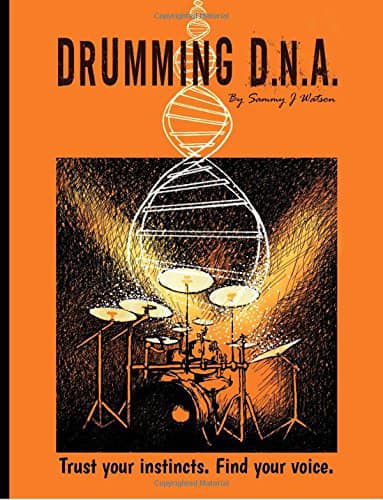
NGC 3169 is a spiral galaxy about 75 million light years away in the constellationSextans. It has the morphological classification SA(s)a pec, which indicates this is a pure, unbarred spiral galaxy with tightly-wound arms and peculiar features. There is an asymmetrical spiral arm and an extended halo around the galaxy. It is a member of the NGC 3166 Group of galaxies, which is a member of the Leo II Groups, a series of galaxies and galaxy clusters strung out from the right edge of the Virgo Supercluster.
NGC 3169 is located in close physical proximity to NGC 3166, and the two have an estimated separation of around 160 kly (50 kpc). Their interaction is creating a gravitational distortion that has left the disk of NGC 3166 warped. Combined with NGC 3156, the three galaxies form a small group within the larger Leo 1 group. The three are embedded within an extended ring of neutral hydrogen that is centered on NGC 3169.
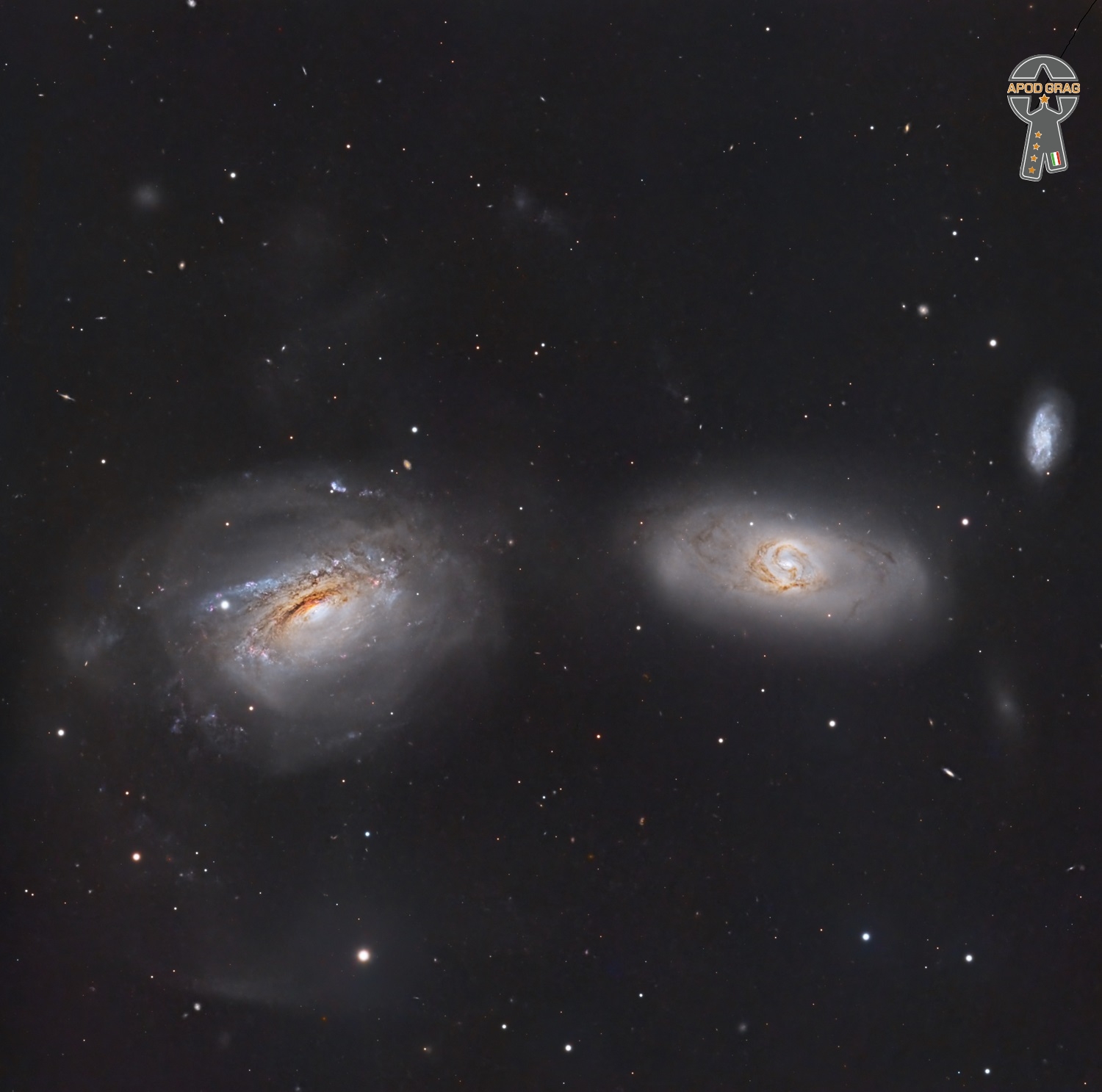
more...
John Cipollina (August 24, 1943 – May 29, 1989) was a guitarist best known for his role as a founder and the lead guitarist of the prominent San Francisco rock band Quicksilver Messenger Service. After leaving Quicksilver he formed the band Copperhead, was a member of the San Francisco All Stars and later played with numerous other bands.
Cipollina had a unique guitar sound, mixing solid state and vacuum-tube (valve) amplifiers as early as 1965. He is considered one of the fathers of the San Francisco sound, a form of psychedelic rock.
I like the rapid punch of solid-state for the bottom, and the rodent-gnawing distortion of the tubes on top.
To create his distinctive guitar sound, Cipollina developed a one-of-a-kind amplifier stack. His Gibson SG guitars had two pickups, one for bass and one for treble. The bass pickup fed into two Standel bass amps on the bottom of the stack, each equipped with two 15-inch speakers. The treble pickups fed two Fender amps: a Fender Twin Reverb and a Fender Dual Showman that drove six Wurlitzer horns. Cipollina died on May 29, 1989 at age 45. His cause of death was alpha-1 antitrypsin deficiency, which he suffered from most of his life and which is exacerbated by smoking.
more...Bartolomé Maximiliano Moré Gutiérrez (24 August 1919 – 19 February 1963), better known as Benny Moré (also spelled Beny Moré), was a Cuban singer, bandleader and songwriter. Due to his fluid tenor voice and his great expressivity, he was known variously as “El Bárbaro del Ritmo” and “El Sonero Mayor”. Moré was a master of the soneo – the art of vocal improvisation in son cubano – and many of his tunes developed this way. He often took part in controversias (vocal duels) with other singers, including Cheo Marquetti and Joseíto Fernández. Apart from son cubano, Moré was a popular singer of guarachas, cha cha cha, mambo, son montuno, and boleros.
Moré started his career with the Trío Matamoros in the 1940s and after a tour in Mexico he decided to stay in the country. Both Moré and dancer Ninón Sevilla made their cinematic debut in 1946’s Carita de cielo, but Moré focused on his music career. In the late 1940s, he sang guaracha-mambos with Pérez Prado, achieving great success. Moré returned to Cuba in 1952 and worked with Bebo Valdés and Ernesto Duarte. In 1953, he formed the Banda Gigante, which became one of the leading Cuban big bands of the 1950s. He suffered from alcoholism and died of liver cirrhosis in 1963 at the age of 43.
more...Arthur William “Big Boy” Crudup (August 24, 1905 – March 28, 1974) was an American Delta blues singer, songwriter and guitarist. He is best known, outside blues circles, for his songs “That’s All Right” (1946),[2] “My Baby Left Me” and “So Glad You’re Mine”, later recorded by Elvis Presley and other artists.
Crudup was born on August 24, 1905, in Union Grove, Forest, Mississippi, to a family of migrant workers traveling through the South and Midwest. The family returned to Mississippi in 1926, where he sang gospel music. He had lessons with a local bluesman, whose name was Papa Harvey, and later he was able to play in dance halls and cafes around Forest. Around 1940 he went to Chicago.
He began his career as a blues singer around Clarksdale, Mississippi. As a member of the Harmonizing Four, he visited Chicago in 1939. He stayed in Chicago to work as a solo musician but barely made a living as a street singer. The record producer Lester Melrose allegedly found him while Crudup was living in a packing crate, introduced him to Hudson Whittaker, better known as Tampa Red, and signed him to a recording contract with RCA Victor‘s Bluebird label.
more...Claude Driskett Hopkins (August 24, 1903 – February 19, 1984) was an American jazz stride pianist and bandleader.
Claude Hopkins was born in Alexandria, Virginia, United States. Historians differ in respect of the actual date of his birth. His parents were on the faculty of Howard University. A talented stride piano player and arranger, he left home at the age of 21 to become a sideman with the Wilbur Sweatman Orchestra, but stayed less than a year. In 1925, he left for Europe as the musical director of The Revue Negre which starred Josephine Baker[4] with Sidney Bechet in the band.
He returned to the US in 1927 where, based in Washington, D.C., he toured the Theatre Owners Booking Association circuit with The Ginger Snaps Revue, before heading once again for New York City where he took over the band of Charlie Skeets. At this time (1932–36), he led a Harlem band employing jazz musicians such as Edmond Hall, Jabbo Smith and Vic Dickenson (although his records were arranged to feature his piano more than his band). This was his most successful period, with long residencies at the Savoy and Roseland ballrooms and at the Cotton Club. In 1937, he took his band on the road with a great deal of success.
more...More Posts
- Cyril Blake Day
- World Music with Simo Lagnawi
- Daily Roots with Joe Higgs
- The Cosmos with NGC 4151
- Manfred Mann Day
- Celia Cruz Day
- Dizzy Gillespie Day
- Don Byas Day
- World Music with ANA ALCAIDE
- Daily Roots with Culture Ft Joseph Hill
- The Cosmos with NGC 6543
- Tom Petty Day
- Eddie Harris Day
- Willie Jones Jr Day
- Jelly Roll Morton Day
- World Music with Domog (Домог)
- Israel Vibration
- RHYTHM ROOTS RESIDENCY Performance MIA 10-19-18
- The Cosmos with Sh2-132
- Masabumi Kikuchi Day
